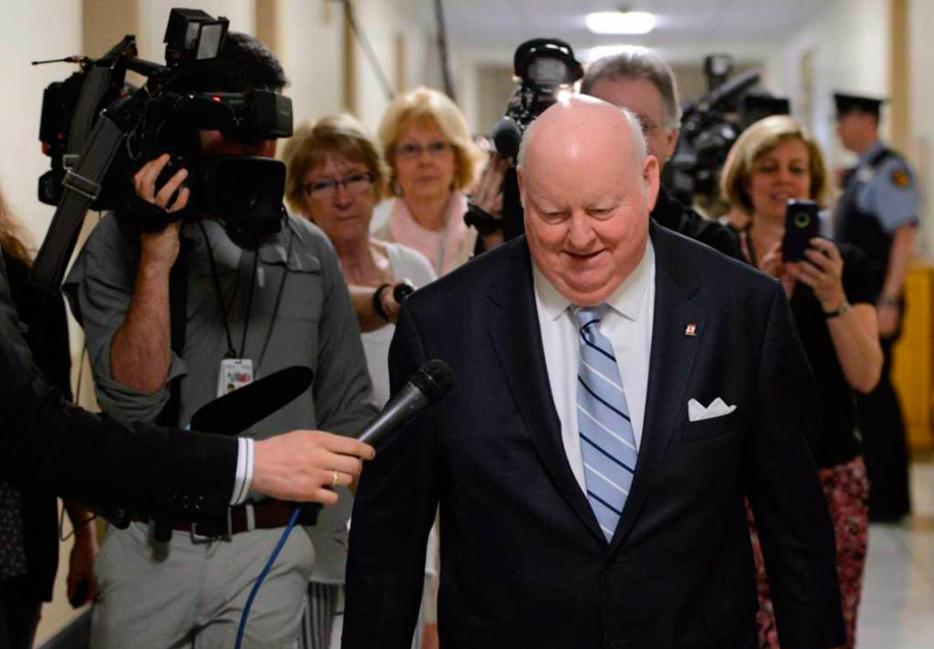Can we all agree that there’s probably no good decision that comes from having any opinion about Mike Duffy? The now-Senator, once-newsperson has managed to blacken the reputation of the Upper House of the Canadian parliament, something that happens more or less once a decade. Duffy and a handful of other senators have found themselves under fire for abusing housing allowances, and costing the Canadian taxpayer a pretty penny. The NDP, who have always thought the Senate should be abolished, unveiled their rolluptheredcarpet.ca campaign, and Maclean’s magazine is calling for abolition. Just one problem: the constitution makes this difficult to impossible.
At best, the Senate could be neutered with seven provinces amounting to half or more of the country’s population. At worst, abolition would almost certainly require the unanimous assent of the provinces. Since either option would also require the Canadian Parliament to chime in, it would require the Senate to essentially vote to either have itself gelded or euthanized.
That’s not inherently crazy: the British House of Lords has had to suffer the indignity of voting for its own irrelevance a few times, something George Dangerfield called “deciding to die in the dark” in his book The Strange Death of Liberal England. The long battle of the British Commons to entrench its supremacy over the Lords makes the insistence by some (Liberals, Conservatives, and the occasional Ottawa reporter) that the Senate is inviolable seem more than a little precious, as if we’re still insisting in 2013 that we have to be plus royaliste que le roi, more committed to a pseudo-aristocratic check on elected democracy than even the British.
So far there seems to be no groundswell of support for abolition; a February poll suggests only one-third of Canadians favour abolition over reform. Of course, that was February, and it’s not like the ensuing three months have been good for the upper chamber. On any given day, it’s a footrace between Mike Duffy and Rob Ford to see who will embarrass their respective assembly more.
The Senate’s defenders will say that it largely does good, under-appreciated work: as one example, Senate committees frequently clean up sloppy law-writing while the Commons is busy beclowning itself in Question Period. You may not think proofreading is a skill we need a whole other legislature for, but details matter. The Senate’s other major activity is reading reports that occasionally garner headlines and then are promptly ignored. Yes, the Senate recommended decriminalizing marijuana. Yes, that’s a no-brainer as far as laws go. Yes, that was 11 years ago.
If you grant that the Senate isn’t entirely useless, reform instead of abolition is appealing. But not every reform is a good idea. An elected senate, equal in formal power to the Commons (as the current one is) is basically a recipe for disaster, as Australia learned in the 1970s. Former Ontario finance minister Greg Sorbara chimed in on the Toronto Star’s pages this week, saying everything would be fine if we just got rid of political parties. The problem with Senate abuses, apparently, is that the perpetrators aren’t unaccountable enough, and right-wing senators should not be forced to answer to even a particularly angry Stephen Harper.
The most likely outcome of all of current events is some minor tinkering around the edges, and a return to the status quo where the Senate is tolerated because, nine days out of ten, we don’t think about it. History suggests we’ll just keep having over 100 people employed for the political equivalent of an appendix, being quietly useful but only ever noticed when something goes wrong. But since we’re never more than a decade or so away from the next Senate scandal, all tinkering will do is keep us lurching, inevitably, towards that day when the upper chamber has to choose whether to “perish in the dark, slain by our own hand, or in the light, killed by our enemies.”






